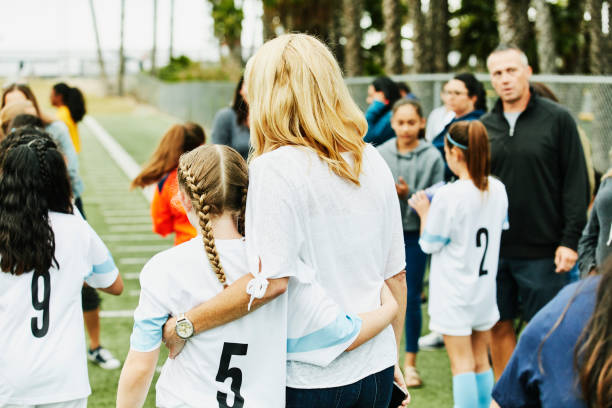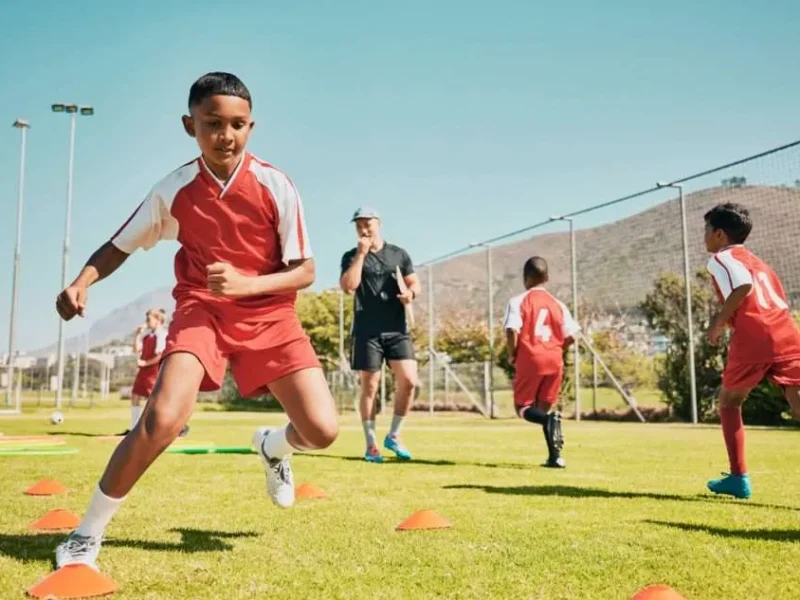Soccer parents, you’re in it. The early morning drives, the mismatched socks, the half-eaten granola bars on your dashboard, and the weekend ritual of hauling folding chairs across dewy grass fields.
You’ve become fluent in game-day chatter, learned to squint into the sun for two hours straight, and somehow memorized the difference between offside and just bad luck.
You’re not just raising a kid; you’re raising a teammate, a competitor, a dreamer. And if i am being honest, you probably care almost as much about their progress as they do (maybe more on certain days).
That care, that love, is beautiful. But it can also lead to a few missteps.
You don’t mean to overstep. No parent does. But sometimes, your excitement, your hopes, your nerves; all that emotional investment can cloud the bigger picture. You want your child to thrive, but what if some of the things you’re doing in the name of love are actually weighing them down?
This isn’t about shaming. It’s about sharpening.
About stepping back just enough so your child can step forward with confidence and joy.
So before you shout the next “Man on!” from the sidelines or schedule that third private session this week, let’s take a breath together and walk through 10 big mistakes every soccer parent should try to avoid.
Not because you’re doing it all wrong, but because we all want to get it a little more right.
1. You Turn Into a Sideline Coach (And Don’t Even Realize It)

You’re watching your kid on the field. The ball rolls toward them. You stand up. “Pass it!” you yell. “Shoot!” “Run back!” You can see the play unfold, and you just have to help.
Except… you’re not helping.
Your child already has a coach. They’re trying to listen to that coach. And now they’re also trying to make you proud, follow your instructions, and stay upright with a defender breathing down their neck.
It’s too much.
Your job is to be the parent, not the play-caller.
Clap. Cheer.
Smile when they look your way. Let the game be their classroom. They’ll learn more from a mistake they make on their own than from any shouted instruction mid-play.
Besides, trust me—if you’re the loudest parent on the sideline, people notice. And not in a good way.
CHECK OUT | How to Be the Best Soccer Parent: Support, Motivate & Inspire Your Child
2. You’re Reliving Your Glory Days Through Their Cleats
You used to play. You were good. Or maybe you weren’t, but you always wanted to be. And now your kid is your second chance.
But here’s the thing, they’re not your do-over. They’re not your legacy. They’re just… them.
Kids can feel when the weight of your past rides on their present. It turns the game into a chore. Every missed goal feels like a disappointment to you. Every win becomes about you.
Take a deep breath and let them own their journey.
Whether they go pro or quit in high school to take up chess, make sure they know your pride in them isn’t performance-based. They’re not here to fix your regrets. They’re here to chase their joy.
3. You Specialize Them Too Soon
They’re seven years old, and already booked solid with skills training, shooting clinics, and a nutrition plan that would make an Olympian blink. You’re investing early, right?
Except, maybe you’re burning them out before they even hit puberty.
Early specialization sounds smart. But research and, you know, common sense shows that kids who play multiple sports tend to be more athletic, more creative, and way less injured. Also? They’re happier.
Let your child try other things. Basketball, swimming, dance, drawing stick figures in the dirt—it’s all part of building a well-rounded human. Soccer will still be there.
And who knows? That season of tennis might give them the footwork edge that sets them apart later.
CHECK OUT | Understanding Soccer Club Fees: What You’re Really Paying For
4. You Turn Every Car Ride Into a Coaching Session

The whistle blows, the game ends, and before they’ve even sat down in the backseat, you’re already reviewing game tape—verbally.
“Why didn’t you shoot?”
“You had space—why didn’t you take it?”
“You didn’t hustle hard enough in the second half.”
Let me offer you a tip: Zip it.
The car ride home is sacred space. It’s where they decompress, snack, and sometimes stare silently out the window wondering if Minecraft would’ve been less stressful than soccer.
Ask them how they felt. Ask if they had fun. Then stop talking. They’ll bring it up if they want to. And when they do, just listen.
You’re not their analyst. You’re their parent.
5. You Think Winning Is Everything

We all love to win. You’ve got the team colors on, the coffee in hand, and maybe you get a little too into it when the score is close.
But when winning becomes the only goal, the whole point of youth sports gets lost.
Your kid isn’t learning resilience or teamwork when the only thing you celebrate is victory. They’re learning that losing equals failure. That mistakes aren’t safe. That pleasing you is more important than enjoying the game.
Celebrate their effort.
Praise their sportsmanship. Be proud when they help a teammate up, not just when they score. And if they lose with grace? That’s a bigger win than the scoreboard will ever show.
CHECK OUT | 10 Best Youth Soccer Clubs in Iowa for Aspiring Players
6. You Compare Them to Other Kids
“Did you see how fast Ryan is?”
“Ella scored again. You need to be more aggressive like her.”
Stop it.
Comparison is the thief of joy, and in youth soccer, it’s also the killer of confidence. Your child is not Ryan. They’re not Ella. They’re your kid and they’re figuring things out at their own pace.
Applaud their progress, not someone else’s stats. Notice when they get better at passing or defending.
Tell them you’re proud of their growth. That’s what builds a self-assured player.
They don’t need to be the best. They just need to feel like they’re enough.
7. You Forget It’s Supposed to Be Fun
The practices. The drills. The extra sessions. The “if you want to be serious, you’ve got to act like it” talks.
And before long, your kid starts dreading the thing they used to love.
Soccer should be fun. It’s a game.
A beautiful, sometimes ridiculous, often muddy, always joyful game. If your kid is not laughing with teammates, trying silly moves, or coming home with grass stains and stories—they’re missing out.
Ask them what they enjoy. Let them play for the love of it, not just for the scholarship or the trophy shelf. Fun keeps them coming back. Pressure pushes them away.
8. You Get Caught in the Parent Drama

There’s always that one parent. Loud. Rude. Complaining about the coach, the refs, the lineup. Sometimes, you’re tempted to jump in. Sometimes you do jump in.
But please; don’t.
Sideline drama is poison. It turns games into tension-fests. It teaches kids that disrespect and entitlement are normal. And it sucks the joy out of the game for everyone.
Be better. Be calm.
Be the one who supports all the players. If there’s a real concern, take it to the right person, the right way. Your kid is watching. Show them how adults handle things with maturity, not gossip and shouting.
CHECK OUT | How Do You Travel for Soccer Games in the USA? A Practical Guide for Parents
9. You Undermine the Coach
You didn’t agree with that substitution. You didn’t like how they benched your child. So you talk about it in front of your kid.
Now your child doesn’t know who to respect. Coach says one thing, you say another. Confusion brews. Trust erodes.
You don’t have to agree with every coaching decision, but you do need to support the system. If there’s a real problem, have a respectful, private chat with the coach. Not in the parking lot. Not on Facebook. Not during halftime.
You’re part of a team too. Act like it.
10. You Forget to Prioritize Rest
Go. Train. Compete. Repeat.
That’s the pattern many families fall into. But your child is still growing. Their body, their mind, their love for the game, it all needs time to recover.
Sleep matters. Free time matters. So do weekends with no soccer and evenings where they just play for the sake of it.
Don’t be afraid to pull back. It won’t ruin their chances. It might just save them from quitting.
Let them miss a session for a family trip. Let them take a week off when they’re tired. The long-term joy of the game depends on not being ground down by it.
Final Whistle
Soccer parenting is not easy. You’re not just raising a player, you’re raising a whole person. And along the way, there are going to be mistakes, moments of frustration, and times you wonder if you’re doing it right.
But here’s the good news: if you care enough to be reading this, you’re already doing better than you think.
Show up. Stay grounded. Cheer loud. Love louder.
CHECK OUT | 7 of the Best Youth Soccer Clubs in Chicago, IL
CHECK OUT | What Skills Should a Girls U14 Soccer Player Have? (And How to Help Her Master Them)



